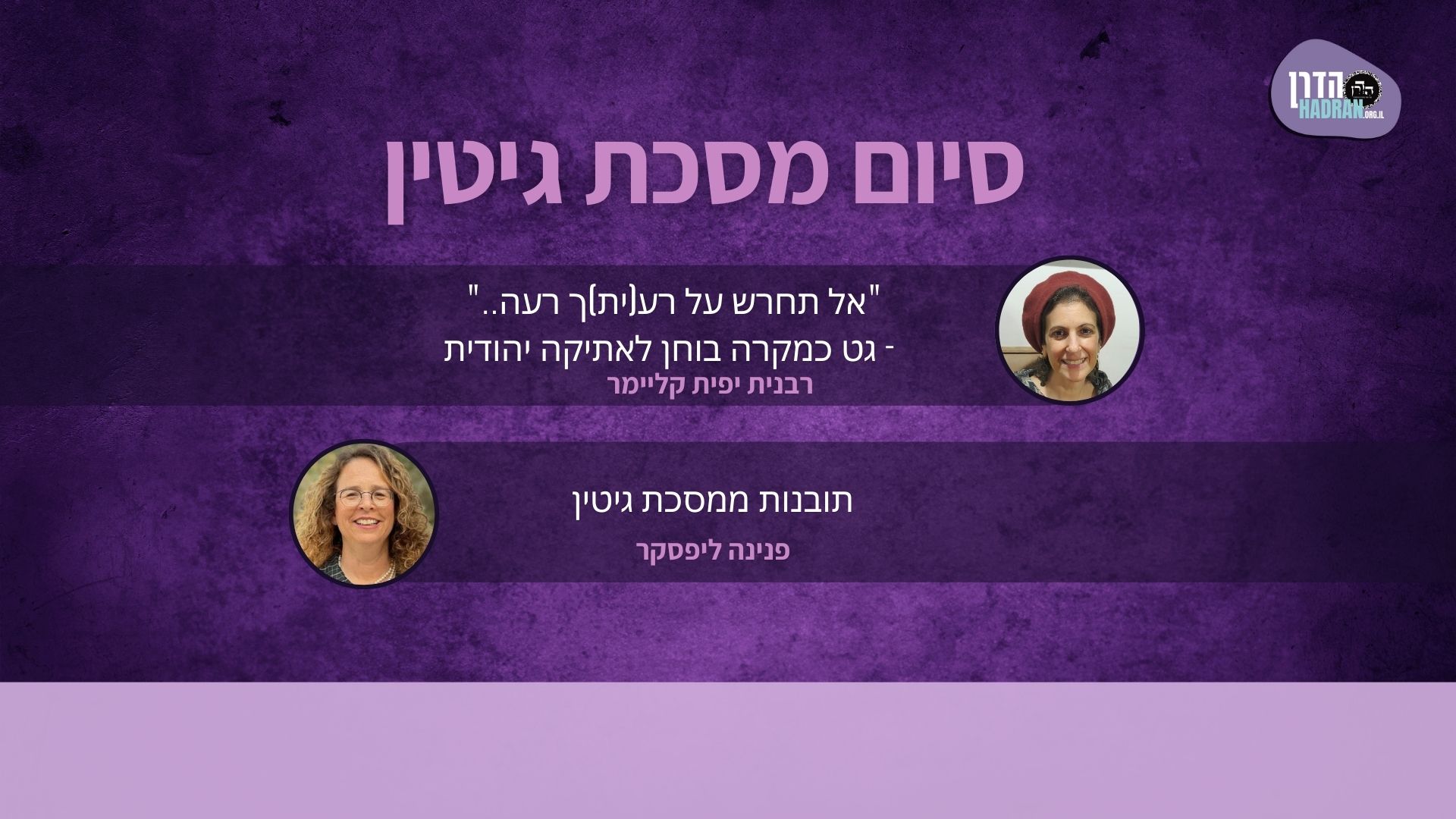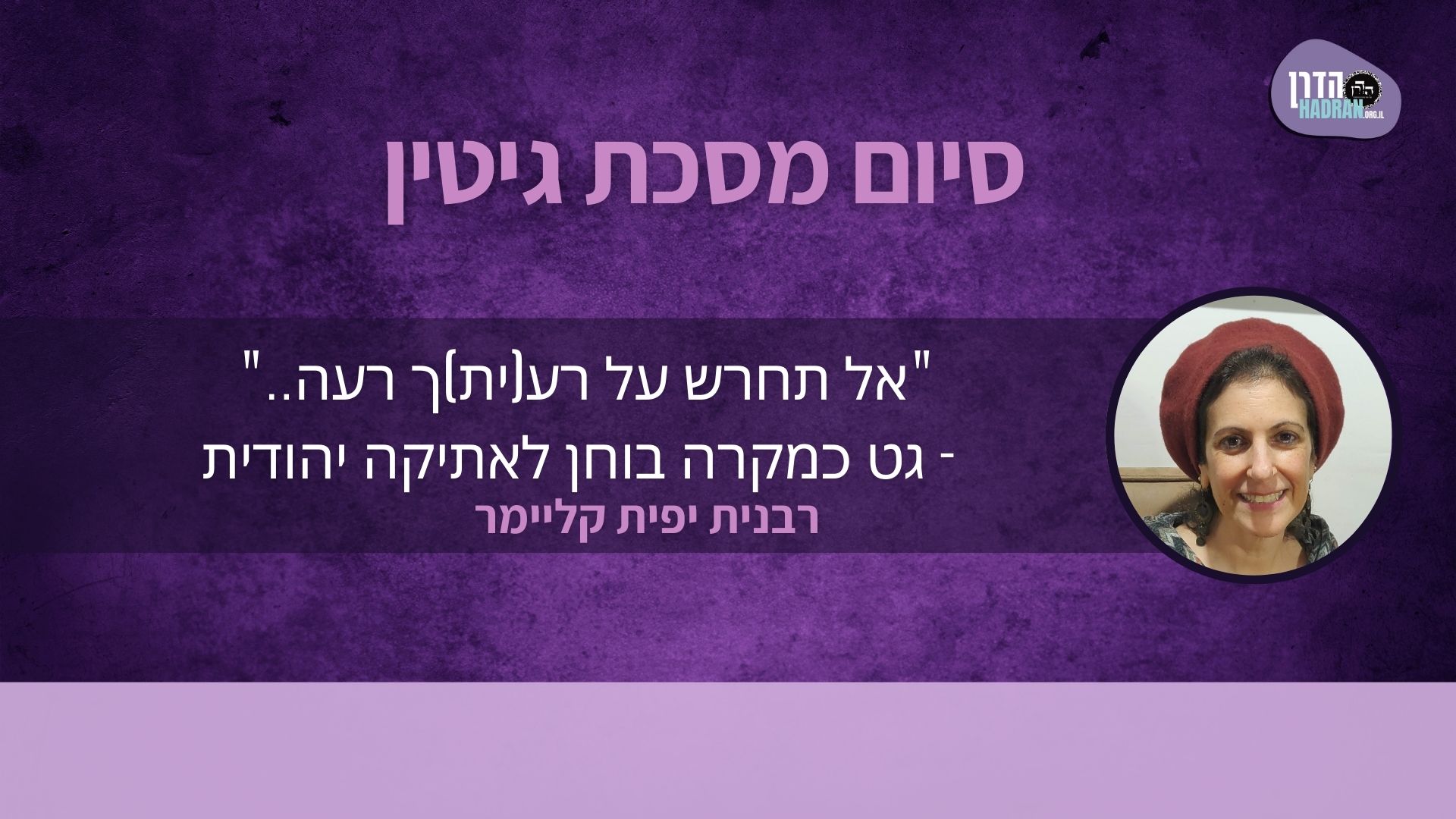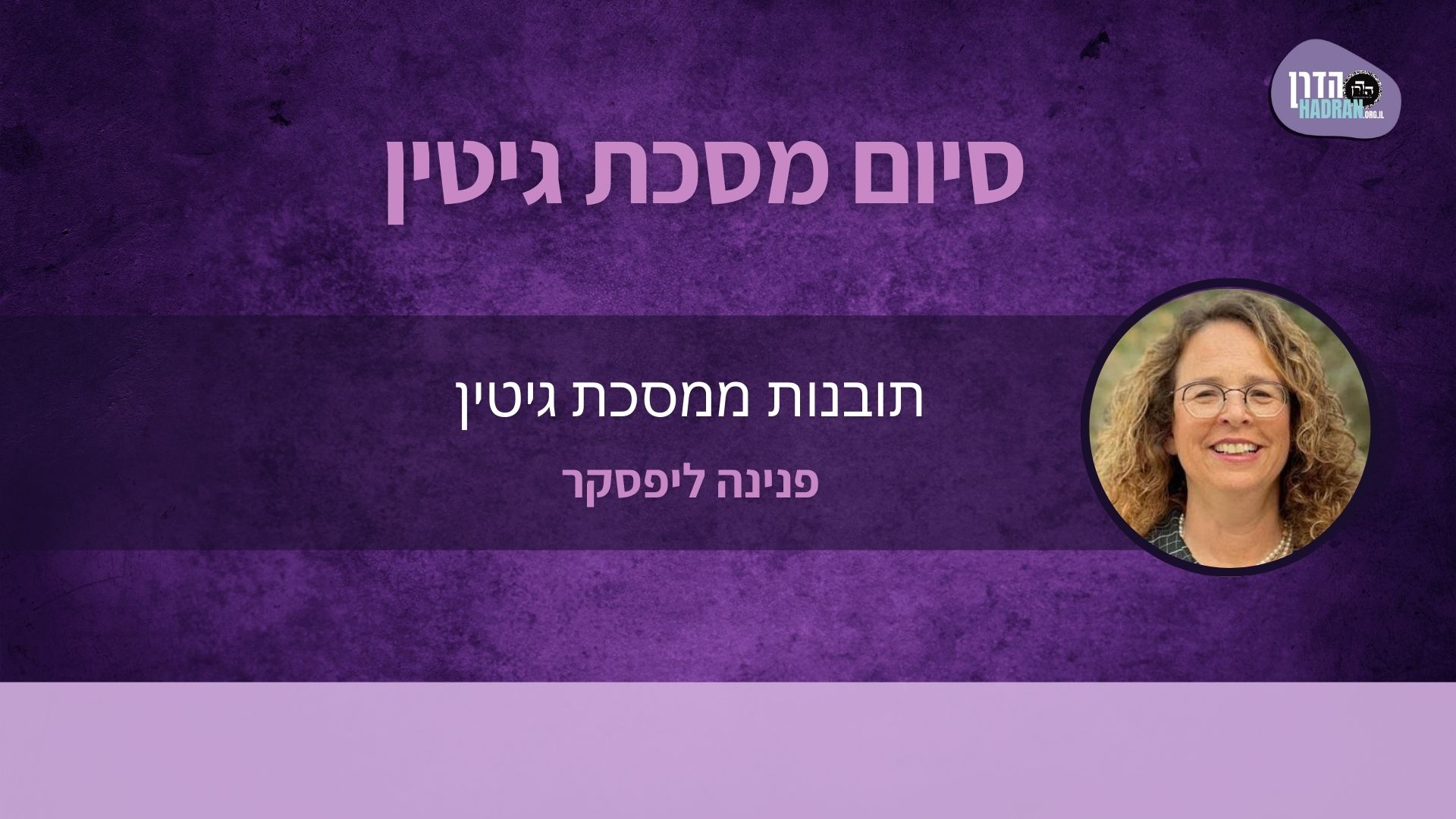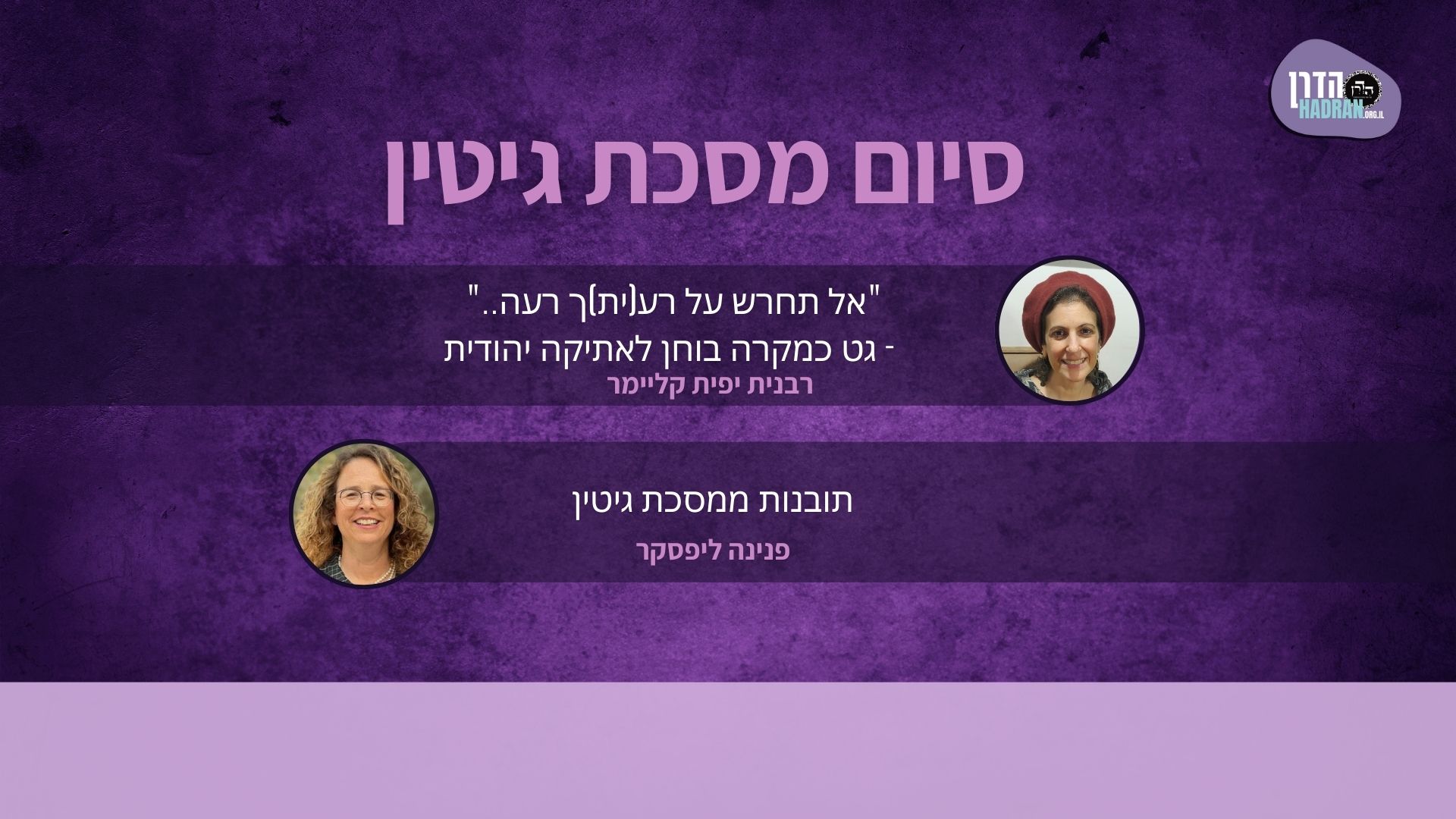הלימוד השבוע מוקדש לזכות ולשלום הַיְימׇנוֹט אֱמוּנָה בַּת באנצ’י (קָסָאוּ) בת 11 שנעלמה במקום מגוריה בצפת, לפני שנתיים, ביום ט”ז אדר תשפ”ד (25.2.24), ולא נודעו עקבותיה.
הלימוד השבוע מוקדש למען ביטחון המדינה, החיילים והאזרחים, ולמען חירותו של העם האיראני. שנזכה בקרוב שיתקיים בנו הפסוק: "לַיְּהוּדִים הָיְתָה אוֹרָה וְשִׂמְחָה וְשָׂשֹׂן וִיקָר”.
רוצה להקדיש שיעור?

כלים
הלימוד השבוע מוקדש לזכות ולשלום הַיְימׇנוֹט אֱמוּנָה בַּת באנצ’י (קָסָאוּ) בת 11 שנעלמה במקום מגוריה בצפת, לפני שנתיים, ביום ט”ז אדר תשפ”ד (25.2.24), ולא נודעו עקבותיה.
הלימוד השבוע מוקדש למען ביטחון המדינה, החיילים והאזרחים, ולמען חירותו של העם האיראני. שנזכה בקרוב שיתקיים בנו הפסוק: "לַיְּהוּדִים הָיְתָה אוֹרָה וְשִׂמְחָה וְשָׂשֹׂן וִיקָר”.
כלים
העמקה
רוצה להבין מה באמת קורה מתחת לפני השטח של הסוגיה?
שיעורים, פודקאסטים והרחבות של מיטב המורות שלנו יפתחו לך עוד זוויות וכיווני חשיבה.
חדשה בלימוד הגמרא?
זה הדף הראשון שלך? איזו התרגשות עצומה! יש לנו בדיוק את התכנים והכלים שיעזרו לך לעשות את הצעדים הראשונים ללמידה בקצב וברמה שלך, כך תוכלי להרגיש בנוח גם בתוך הסוגיות המורכבות ומאתגרות.
פסיפס הלומדות שלנו
גלי את קהילת הלומדות שלנו, מגוון נשים, רקעים וסיפורים. כולן חלק מתנועה ומסע מרגש ועוצמתי.
גיטין פד
מִסְתַּבְּרָא, בֵּין לְרַבִּי אֱלִיעֶזֶר בֵּין לְרַבָּנַן, כֵּיוָן דְּפַסְקַהּ – פַּסְקַהּ.
It stands to reason, both according to Rabbi Eliezer and according to the Rabbis, that once he separates her, he has separated her entirely. By rendering her entirely permitted for one day he dissolves the bond between them and the divorce takes effect.
תָּנוּ רַבָּנַן: ״הֲרֵי זֶה גִּיטִּיךְ עַל מְנָת שֶׁתִּנָּשְׂאִי לִפְלוֹנִי״ – הֲרֵי זוֹ לֹא תִּנָּשֵׂא, וְאִם נִשֵּׂאת – לֹא תֵּצֵא.
§ The Sages taught (Tosefta 6:7) that if a man says to his wife: This is your bill of divorce on the condition that you marry so-and-so, she may not marry that man, but if she marries him the marriage is valid and she need not leave her husband.
מַאי קָאָמַר? אָמַר רַב נַחְמָן, הָכִי קָאָמַר: הֲרֵי זוֹ לֹא תִּנָּשֵׂא לוֹ, שֶׁמָּא יֹאמְרוּ נְשֵׁיהֶן נוֹתְנִין בְּמַתָּנָה. וְאִם נִשֵּׂאת לְאַחֵר – לֹא תֵּצֵא.
The Gemara asks: What is the baraita saying? She is forbidden from marrying whom? Rav Naḥman said that this is what the baraita is saying: She may not marry him, i.e., she may not marry the man mentioned by her husband in the condition, lest people say that these people are giving their wives to each other as a gift. But if she marries another man she need not leave him.
וּמִשּׁוּם גְּזֵרָה – לָא מַפְּקִינַן מִינֵּיהּ, וְשָׁרֵינַן אֵשֶׁת אִישׁ לְעָלְמָא?!
The Gemara asks: Do we not remove her from him, thereby allowing a married woman to marry anyone, due to a rabbinic decree, lest people say that the husband is giving her as a gift? As long as the condition that she would marry a specific man is not fulfilled, she is a married woman by Torah law.
אֶלָּא אָמַר רַב נַחְמָן, הָכִי קָאָמַר: הֲרֵי זוֹ לֹא תִּנָּשֵׂא לוֹ, שֶׁמָּא יֹאמְרוּ נְשֵׁיהֶם נוֹתְנִין בְּמַתָּנָה. וְאִם נִשֵּׂאת לוֹ – לֹא תֵּצֵא, דְּמִשּׁוּם גְּזֵרָה לָא מַפְּקִינַן.
Rather, Rav Naḥman said that this is what the baraita is saying: She may not marry him, i.e., the man who was specified in the condition, lest people say that they are giving their wives to each other as a gift. But if she marries him she need not leave him, as we do not remove a woman from her husband due to a decree.
אֲמַר לֵיהּ רָבָא: לוֹ – הוּא דְּלֹא תִּנָּשֵׂא, הָא לְאַחֵר – תִּנָּשֵׂא?! וְהָא בָּעֲיָא קַיּוֹמֵיהּ לִתְנָאָה!
Rava said to Rav Naḥman: It may be inferred from your statement that it is specifically to him that she may not get married, but she may marry another man ab initio. But isn’t she required to fulfill the condition by marrying the specified man before marrying someone else?
וְכִי תֵּימָא: אֶפְשָׁר דְּמִינַּסְבָא הַיּוֹם וּמִיגָּרְשָׁה לִמְחַר – וּמְקַיְּימָא לִתְנָאָה; וּלְהָךְ דִּפְלִיגַתְּ עֲלֵיהּ דְּרַב יְהוּדָה קָמְדַמֵּית לֵיהּ – דְּאִתְּמַר: ״קֻוֽנָּם עֵינַי בְּשֵׁינָה הַיּוֹם, אִם אִישַׁן לְמָחָר״, אָמַר רַב יְהוּדָה: אַל יִישַׁן הַיּוֹם, שֶׁמָּא יִישַׁן לְמָחָר;
And if you would say that it is possible for her to get married today to someone else and get divorced from him tomorrow and then fulfill her condition by marrying the specified man, and you can compare it to that halakha over which you disagree with Rav Yehuda. As it was stated with regard to one who says: Sleeping is forbidden to me as if it were an offering [konam] for my eyes today if I will sleep tomorrow, Rav Yehuda says that he may not sleep today lest he sleep tomorrow, causing the vow to have been violated today, retroactively.
וְרַב נַחְמָן אָמַר: יִישַׁן הַיּוֹם, וְאֵין חוֹשְׁשִׁין שֶׁמָּא יִישַׁן לְמָחָר;
And Rav Naḥman says: He may sleep today, as there is currently no prohibition, and we are not concerned that perhaps he will sleep tomorrow, as he will be careful not to sleep. This dispute pertains to the general issue of a prohibition that will take effect retroactively if a condition is not fulfilled. Rav Yehuda holds that the prohibition must be observed until the condition is fulfilled, whereas Rav Naḥman maintains that it is not necessary to observe the prohibition, as he assumes that the condition will be fulfilled. Here too, perhaps Rav Naḥman allows the woman to marry another man because she can fulfill the condition after she is divorced from him.
הָכִי הַשְׁתָּא?! הָתָם בְּדִידֵיהּ קָיְימָא, דְּאִי בָּעֵי – מְבָרֵיז נַפְשֵׁיהּ בְּסִילְוָאתָא, וְלָא נָאֵים; הָכָא – בְּדִידַהּ קָיְימָא לְאִיגָּרוֹשֵׁי?!
How can these cases be compared? There, in the case of the vow, the fulfillment of the condition is in his capability, as, if he wants to prevent himself from falling asleep he can prick himself with thorns [silevata] and he will not fall asleep. Here, is it in the woman’s power to get divorced? Perhaps her husband will not agree to divorce her and the condition will not be fulfilled.
אֶלָּא אָמַר רָבָא: הֲרֵי זוֹ לֹא תִּנָּשֵׂא לֹא לוֹ, וְלֹא לְאַחֵר. לוֹ לֹא תִּנָּשֵׂא – שֶׁמָּא יֹאמְרוּ: נְשׁוֹתֵיהֶם נוֹתְנִין בְּמַתָּנָה; לְאַחֵר לֹא תִּנָּשֵׂא – דְּבָעֲיָא קַיּוֹמֵיהּ לִתְנָאָה.
Rather, Rava said that the baraita should be interpreted in the following manner: This woman may marry neither the man who was specified in the condition nor another man. She may not marry him lest people say that these men are giving their wives to each other as a gift, and she may not marry another man because she is required to fulfill the condition.
וְאִם נִשֵּׂאת לוֹ לֹא תֵּצֵא – דְּמִשּׁוּם גְּזֵרָה לָא מַפְּקִינַן; לְאַחֵר תֵּצֵא – דְּבָעֲיָא לְקַיּוֹמֵיהּ לִתְנָאָה.
And if she marries the specified man she need not leave him, as we do not remove a woman from her husband due to a decree. But if she gets married to another man she must leave him, as she is required to fulfill the condition before marrying another man.
תַּנְיָא כְּווֹתֵיהּ דְּרָבָא: הֲרֵי זוֹ לֹא תִּנָּשֵׂא לֹא לוֹ וְלֹא לְאַחֵר, וְאִם נִשֵּׂאת לוֹ – לֹא תֵּצֵא, לְאַחֵר – תֵּצֵא.
It is taught in a baraita in accordance with the opinion of Rava: This woman may marry neither him nor another man, but if she marries him she need not leave him. But if she gets married to another man she must leave him.
תָּנוּ רַבָּנַן: ״הֲרֵי זֶה גִּיטִּךְ עַל מְנָת שֶׁתַּעֲלִי לָרָקִיעַ״; ״עַל מְנָת שֶׁתֵּרְדִי לַתְּהוֹם״; ״עַל מְנָת שֶׁתִּבְלְעִי קָנֶה שֶׁל אַרְבַּע אַמּוֹת״; ״עַל מְנָת שֶׁתָּבִיאִי לִי קָנֶה בֶּן מֵאָה אַמָּה״; ״עַל מְנָת שֶׁתַּעַבְרִי אֶת הַיָּם הַגָּדוֹל בְּרַגְלַיִךְ״ – אֵינוֹ גֵּט.
§ The Sages taught (Tosefta 7:8) that if a man says to his wife: This is your bill of divorce on the condition that you ascend to the sky, or on the condition that you descend to the depths of the sea, or on the condition that you swallow a four-cubit reed, or on the condition that you bring me a hundred-cubit reed, or on the condition that you cross the Great Sea, i.e., the Mediterranean Sea, by foot, or on any other condition that it is impossible to fulfill, it is not a valid bill of divorce.
רַבִּי יְהוּדָה בֶּן תֵּימָא אוֹמֵר: כָּזֶה – גֵּט. כְּלָל אָמַר רַבִּי יְהוּדָה בֶּן תֵּימָא: כׇּל תְּנַאי שֶׁאִי אֶפְשָׁר לוֹ לְקַיְּימוֹ בְּסוֹפוֹ, וְהִתְנָה עָלָיו מִתְּחִילָּתוֹ – אֵינוֹ אֶלָּא כְּמַפְלִיגָהּ בִּדְבָרִים, וְכָשֵׁר.
Rabbi Yehuda ben Teima says: A bill of divorce like this is a valid bill of divorce, as the condition is void. Rabbi Yehuda ben Teima said the following principle: With regard to any condition that cannot be fulfilled in the end, yet even so the husband stipulated it initially, he is only hyperbolizing. It is assumed that he did not really intend to attach a condition to the divorce, but rather, to cause her distress, and therefore the divorce is valid without her fulfilling the condition.
אָמַר רַב נַחְמָן אָמַר רַב: הֲלָכָה כְּרַבִּי יְהוּדָה בֶּן תֵּימָא. אָמַר רַב נַחְמָן בַּר יִצְחָק: מַתְנִיתִין נָמֵי דַּיְקָא, דְּקָתָנֵי: כׇּל שֶׁאֶפְשָׁר לוֹ לְקַיְּימוֹ בְּסוֹפוֹ, וְהִתְנָה עָלָיו בִּתְחִילָּתוֹ – תְּנָאוֹ קַיָּים; הָא אִי אֶפְשָׁר – תְּנָאוֹ בָּטֵל; שְׁמַע מִינַּהּ.
Rav Naḥman says that Rav says: The halakha is in accordance with the opinion of Rabbi Yehuda ben Teima. Rav Naḥman bar Yitzḥak says: The language of the mishna is also precisely formulated in support of this opinion, as it teaches: With regard to any condition that can be fulfilled in the end and the husband stipulated it initially, his condition stands (Bava Metzia 94a). Consequently, if his condition cannot be fulfilled it is void. The Gemara concludes: Learn from it that the halakha is in accordance with the opinion of Rabbi Yehuda ben Teima.
אִיבַּעְיָא לְהוּ: ״הֲרֵי זֶה גִּיטִּיךְ עַל מְנָת שֶׁתֹּאכְלִי בְּשַׂר חֲזִיר״, מַהוּ? אָמַר אַבָּיֵי: הִיא הִיא. רָבָא אָמַר: אֶפְשָׁר דְּאָכְלָה וְלָקְיָא.
A dilemma was raised before the Sages: If a husband said to his wife: This is your bill of divorce on the condition that you eat pig meat, what is the halakha? Abaye said: It is the same. This is also a condition that cannot be fulfilled, as it is forbidden by Torah law. Therefore, the condition is void. Rava said: It is possible for her to eat it and be flogged for it. Consequently, the condition can be fulfilled, although it is forbidden for her to do so.
לְאַבָּיֵי, ״כְּלָל״ – לְאֵתוֹיֵי בְּשַׂר חֲזִיר. לְרָבָא, ״כָּזֶה״ – לְמַעוֹטֵי בְּשַׂר חֲזִיר.
The Gemara elaborates: According to Abaye, the principle stated by Rabbi Yehuda ben Teima serves to include a condition to eat pig meat. When a tanna states a general principle, it expands the halakha beyond the specific case mentioned previously. In this case, the stating of the principle serves to apply the halakha to a condition subject to a Torah prohibition, in addition to a physical impossibility. According to Rava, when Rabbi Yehuda ben Teima stated: A bill of divorce like this is a valid bill of divorce, the limiting term of: Like this, serves to emphasize that only when there is a condition that cannot be physically fulfilled is the bill of divorce valid, and serves to exclude a condition to eat pig meat, which cannot be fulfilled due to a Torah prohibition. Therefore, if she does not fulfill this condition the divorce is invalid.
מֵיתִיבִי: ״הֲרֵי זֶה גִּיטִּךְ עַל מְנָת שֶׁתִּבָּעֲלִי לִפְלוֹנִי״, נִתְקַיֵּים הַתְּנַאי – הֲרֵי זֶה גֵּט, וְאִם לָאו – אֵינוֹ גֵּט. ״עַל מְנָת שֶׁלֹּא תִּבָּעֲלִי לְאַבָּא, וּלְאָבִיךְ״ – אֵין חוֹשְׁשִׁין שֶׁמָּא נִבְעֲלָה לָהֶן.
The Gemara raises an objection to Rava’s opinion from a baraita: If a man says to his wife: This is your bill of divorce on the condition that you engage in sexual intercourse with so-and-so, and the condition is fulfilled, this is a valid bill of divorce. And if the condition is not fulfilled then it is not a valid bill of divorce. If he says to her: On the condition that you do not engage in sexual intercourse with my father or your father, she is permitted to remarry, as we are not concerned that perhaps she engaged in sexual intercourse with them.
וְאִילּוּ ״עַל מְנָת שֶׁתִּבָּעֲלִי לְאַבָּא וּלְאָבִיךְ״ – לָא קָתָנֵי; לְאַבָּיֵי נִיחָא, לְרָבָא קַשְׁיָא!
But the baraita does not teach that the condition is binding when the husband says: On the condition that you engage in sexual intercourse with my father or your father, which is forbidden by Torah law. According to Abaye it works out well, as in his opinion a condition that violates Torah law is void. According to Rava it is difficult.
אָמַר לָךְ רָבָא: בִּשְׁלָמָא בְּשַׂר חֲזִיר – אֶפְשָׁר דְּאָכְלָה וְלָקְיָא; פְּלוֹנִי נָמֵי – אֶפְשָׁר דִּמְשַׁחֲדָא לֵיהּ בְּמָמוֹנָא; אֶלָּא אַבָּא וְאָבִיךְ – בְּדִידַהּ קָיְימָא?! נְהִי דְּאִיהִי עָבְדָא אִיסּוּרָא, אַבָּא וְאָבִיךְ מִי עָבְדִי אִיסּוּרָא?!
The Gemara answers that Rava could have said to you: Granted, with regard to pig meat it is possible for her to eat it and be flogged. Similarly, if the condition is that she engage in sexual intercourse with so-and-so, it is also possible for her to bribe him with money to engage in sexual intercourse with her. But with regard to the case of my father or your father, is it in her power to engage in sexual intercourse with them? Though she can potentially perform a forbidden act in order to fulfill her desire to get married, would my father or your father perform a forbidden act? They certainly would not cooperate. Therefore, this is a condition that cannot be fulfilled, and it is considered hyperbole.
לְרָבָא, ״כְּלָל״ – לְאֵתוֹיֵי אַבָּא וְאָבִיךְ; ״כָּזֶה״ – לְמַעוֹטֵי בְּשַׂר חֲזִיר.
Based on this analysis, according to Rava, Rabbi Yehuda ben Teima stated his principle in order to include the condition of my father and your father, as this condition is also considered impossible to fulfill. And the expression: A bill of divorce like this is a valid bill of divorce, serves to exclude the condition of eating pig meat, in which case the divorce is not valid unless she fulfills the condition.
לְאַבָּיֵי, ״כְּלָל״ – לְאֵתוֹיֵי בְּשַׂר חֲזִיר; ״כָּזֶה״ – לְמַעוֹטֵי פְּלוֹנִי.
And according to Abaye this principle was stated to include the case of a condition that she should eat pig meat, and the expression: A bill of divorce like this is a valid bill of divorce, serves to exclude a condition that she should engage in sexual intercourse with so-and-so, in which case the divorce takes effect only once the condition is fulfilled, as it is possible to fulfill this condition in a permitted manner.
מֵיתִיבִי: ״הֲרֵי זֶה גִּיטִּיךְ עַל מְנָת שֶׁתֹּאכְלִי בְּשַׂר חֲזִיר״; וְאִם הָיְתָה זָרָה – ״עַל מְנָת שֶׁתֹּאכְלִי בִּתְרוּמָה״; וְאִם הָיְתָה נְזִירָה – ״עַל מְנָת שֶׁתִּשְׁתִּי יַיִן״; נִתְקַיֵּים הַתְּנַאי – הֲרֵי זֶה גֵּט; וְאִם לָאו – אֵינוֹ גֵּט. לְרָבָא נִיחָא, לְאַבָּיֵי קַשְׁיָא!
The Gemara raises an objection from another baraita (Tosefta 6:10): If the husband said to his wife: This is your bill of divorce on the condition that you eat pig meat; or similarly, if she was a non-priestess, i.e., the daughter of an Israelite, and he stipulated: On the condition that you partake of teruma; or if she was a nazirite and he stipulated: On the condition that you drink wine (see Numbers 6:3); in all of these cases, if the condition is fulfilled it is a valid bill of divorce, and if not, it is not a valid bill of divorce. This works out well according to Rava, who holds that a condition that she should perform a forbidden act is binding; according to Abaye it is difficult.
אָמַר לָךְ אַבָּיֵי: מִי סָבְרַתְּ דִּבְרֵי הַכֹּל הִיא?! הָא מַנִּי – רַבָּנַן הִיא.
The Gemara answers that Abaye could have said to you: Do you hold that this ruling is agreed upon by everyone? That is not the case. Rather, in accordance with whose opinion is this baraita? It is in accordance with the opinion of the Rabbis, who disagree with Rabbi Yehuda ben Teima, maintaining that even a condition that cannot be fulfilled is a valid condition.
וְתִיפּוֹק לֵיהּ דְּמַתְנֶה עַל מַה שֶּׁכָּתוּב בַּתּוֹרָה הוּא, וְכׇל הַמַּתְנֶה עַל מַה שֶּׁכָּתוּב בַּתּוֹרָה – תְּנָאוֹ בָּטֵל!
The Gemara challenges: Regardless of the issue of a condition that cannot be fulfilled, derive that this condition is void from the fact that the husband is stipulating counter to that which is written in the Torah, and there is a principle that with regard to anyone who stipulates counter to that which is written in the Torah, his condition is void.
אָמַר רַב אַדָּא בְּרֵיהּ דְּרַב אִיקָא: כִּי אָמְרִינַן מַתְנֶה עַל מַה שֶּׁכָּתוּב בַּתּוֹרָה תְּנָאוֹ בָּטֵל – כְּגוֹן שְׁאֵרָהּ כְּסוּתָהּ וְעוֹנָתָהּ, דְּהוּא קָא עָקַר; אֲבָל הָכָא – אִיהִי קָא עָקְרָה.
Rav Adda son of Rav Ika said in response: When we say that if one stipulates counter to that which is written in the Torah his condition is void, the reference is to a case such as a man who betroths a woman on the condition that he will not be obligated to provide her with her food, her clothing, and her conjugal rights, as there he is uprooting a matter of Torah law by fulfilling the condition. But here, it is she who is uprooting a matter of Torah law by fulfilling the condition and not him.
מַתְקֵיף לַהּ רָבִינָא: כְּלוּם קָא עָקְרָה אִיהִי – אֶלָּא לְקַיּוֹמֵי לִתְנַאי דִּידֵיהּ; אִישְׁתְּכַח דְּאִיהוּ קָא עָקַר!
Ravina strongly objects to this response: Isn’t she uprooting it only in order to fulfill his condition? It is therefore found that he is uprooting a matter of Torah law by attaching this condition to the divorce.
אֶלָּא אָמַר רָבִינָא: כִּי אָמְרִינַן מַתְנֶה עַל מַה שֶּׁכָּתוּב בַּתּוֹרָה תְּנָאוֹ בָּטֵל – כְּגוֹן שְׁאֵרָהּ כְּסוּתָהּ וְעוֹנָתָהּ, דְּוַדַּאי קָא עָקַר; אֲבָל הָכָא – מִי קָאָמַר לַהּ: לָא סַגִּיא דְּלָא אָכְלָה?! לָא תֵּיכוֹל, וְלָא תִּיגָּרַשׁ.
Rather, Ravina said: When we say that if one stipulates counter to that which is written in the Torah, that his condition is void, the reference is to a case such as that of a man who stipulates that he will not be obligated to provide his wife with her food, her clothing, and her conjugal rights, as by attaching this condition he is definitely uprooting a matter of Torah law. But here, is he saying to her that it is not possible for her not to eat? She may not eat and not get divorced. The condition does not counter Torah law in and of itself, as the wife has the choice of whether or not to fulfill it.
כֵּיצַד יַעֲשֶׂה – יִטְּלֶנּוּ הֵימֶנָּה וְכוּ׳: מַאן תַּנָּא? אָמַר חִזְקִיָּה: רַבִּי שִׁמְעוֹן בֶּן אֶלְעָזָר הִיא.
§ It is stated in the mishna: What should he do after giving her the bill of divorce and stipulating that she is not permitted to so-and-so? He should take it from her, and hand it to her again, and say to her: You are hereby permitted to marry any man. The Gemara asks: Who is the tanna who taught that? Ḥizkiyya said that it is Rabbi Shimon ben Elazar.
דְּתַנְיָא, רַבִּי שִׁמְעוֹן בֶּן אֶלְעָזָר אוֹמֵר: עַד שֶׁיִּטְּלֶנּוּ הֵימֶנָּה, וְיַחֲזוֹר וְיִתְּנֶנּוּ לָהּ, וְיֹאמַר לָהּ: ״הֵי גִּיטִּיךְ״.
As it is taught in a baraita: If a husband gives his wife a bill of divorce without her knowledge, Rabbi Shimon ben Elazar says that it does not take effect until he takes it from her, and hands it to her again, and says to her: This is your bill of divorce. Rabbi Yehuda HaNasi holds that it is not necessary for him to hand it to her a second time; rather, it is sufficient for him to tell her that he is giving her a bill of divorce. The mishna is therefore in accordance with the opinion of Rabbi Shimon ben Elazar, who holds that the husband must hand it to her again.
רַבִּי יוֹחָנָן אָמַר: אֲפִילּוּ תֵּימָא רַבִּי – דִּילְכוֹן אָמַר: שָׁאנֵי הָכָא, הוֹאִיל וְקִנְאָתוֹ לִיפָּסֵל בּוֹ לַכְּהוּנָּה.
Rabbi Yoḥanan said: You can even say that it is in accordance with the opinion of Rabbi Yehuda HaNasi. Your Sage, referring to Rav Kahana, who came from Babylonia to study in Eretz Yisrael, said that it is different here, since the wife has already acquired the bill of divorce with regard to her becoming disqualified from marrying into the priesthood due to it, and Rabbi Yehuda HaNasi holds that he need not take it back and give it to her again. Since the bill of divorce was already partially effective, it is in the wife’s possession and cannot be used by the husband to divorce her in full unless she gives it back to him and he gives it to her again. Therefore, even Rabbi Yehuda HaNasi agrees that he must give it to her a second time.
כְּתָבוֹ בְּתוֹכוֹ: אָמַר רַב סָפְרָא: ״כְּתָבוֹ בְּתוֹכוֹ״ תְּנַן.
§ It is stated in the mishna that if the husband wrote his qualification inside the bill of divorce, it is invalid even if he subsequently erased it. Rav Safra said: We learned in the mishna that the bill is invalid only if he wrote the qualification inside the bill of divorce, not if he stated it orally.
פְּשִׁיטָא, ״כְּתָבוֹ בְּתוֹכוֹ״ תְּנַן! מַהוּ דְּתֵימָא הָנֵי מִילֵּי לְאַחַר הַתּוֹרֶף, אֲבָל לִפְנֵי הַתּוֹרֶף – אֲפִילּוּ עַל פֶּה נָמֵי פָּסוּל, קָא מַשְׁמַע לַן.
The Gemara asks: It is obvious that this is the case, as we learned in the mishna explicitly that he wrote it inside. The Gemara answers: Rav Safra stated this lest you say that this matter applies only when the qualification was written after the essential part of the bill of divorce, which contains the names of the husband and wife and the date, but before the essential part was written; even if the qualification was stated orally, the bill of divorce is invalid, as it was written with the intention that the wife would not be permitted to marry any man. Rav Safra therefore teaches us that only a written qualification in the bill of divorce renders it invalid, and an oral statement does not render it invalid. Consequently, the husband can hand this bill of divorce to his wife without stating the qualification and it will be valid.
וְרָבָא אָמַר: לֹא שָׁנוּ אֶלָּא לְאַחַר הַתּוֹרֶף, אֲבָל לִפְנֵי הַתּוֹרֶף – אֲפִילּוּ עַל פֶּה נָמֵי פָּסוּל.
And Rava said: They taught that it is specifically writing the qualification that invalidates the bill of divorce only when the qualification is stated after the writing of the essential part. But if the qualification is stated before the essential part of the bill of divorce is written, even if it is stated orally, the bill of divorce is invalid.
וְאַזְדָּא רָבָא לְטַעְמֵיהּ – דַּאֲמַר לְהוּ רָבָא לְהָנְהוּ דְּכָתְבִי גִּיטֵּי: שַׁתִּקוּ שַׁתּוֹקֵי לְבַעַל, עַד דְּכָתְבִיתוּ לֵיהּ לְתוֹרֶף דְּגִיטָּא.
And Rava followed his line of reasoning, as Rava said to those who write bills of divorce: Silence the husband until you write the essential part of the bill of divorce, lest he state a condition, thereby rendering the bill of divorce invalid.
תָּנוּ רַבָּנַן: כׇּל הַתְּנָאִין פּוֹסְלִין בַּגֵּט, דִּבְרֵי רַבִּי. וַחֲכָמִים אוֹמְרִים: כֹּל שֶׁפּוֹסֵל עַל פֶּה פּוֹסֵל בִּכְתָב, וְכֹל שֶׁאֵינוֹ פּוֹסֵל עַל פֶּה אֵינוֹ פּוֹסֵל בִּכְתָב – ״חוּץ״, שֶׁפּוֹסֵל עַל פֶּה, פּוֹסֵל בִּכְתָב; ״עַל מְנָת״, שֶׁאֵינוֹ פּוֹסֵל עַל פֶּה, אֵינוֹ פּוֹסֵל בִּכְתָב.
The Sages taught: All conditions that are written in a bill of divorce invalidate it, this is the statement of Rabbi Yehuda HaNasi. And the Rabbis say: Any qualification that invalidates the divorce when stated orally by the husband while he hands the bill of divorce to his wife invalidates it when written, and any qualification that does not invalidate it when stated orally does not invalidate it when written. Therefore, issuing a qualification that she is permitted to marry any man except for so-and-so, which invalidates the divorce when stated orally, invalidates it as well when written, whereas attaching a standard condition, which does not invalidate it when stated orally, does not invalidate it when written.
אָמַר רַבִּי זֵירָא: מַחְלוֹקֶת לִפְנֵי הַתּוֹרֶף – דְּרַבִּי סָבַר: גָּזְרִינַן ״עַל מְנָת״ אַטּוּ ״חוּץ״; וְרַבָּנַן סָבְרִי: לָא גָּזְרִינַן ״עַל מְנָת״ אַטּוּ ״חוּץ״. אֲבָל לְאַחַר הַתּוֹרֶף –
Rabbi Zeira said: This dispute applies to a case where the condition was written in the bill of divorce before the essential part was written, as Rabbi Yehuda HaNasi holds that we issue a decree that a stipulation invalidates the bill of divorce due to a case of an exception, and the Rabbis hold that we do not issue a decree that a stipulation invalidates it due to a case of an exception. But if it was written after the essential part,





































